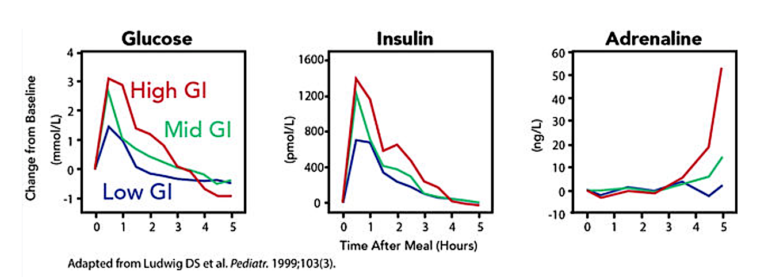In this 2017 piece for Psychology Today, Georgia Ede argues high-glycemic-index foods drive hormonal changes that negatively affect mood and behavior.
Consuming carbohydrate-rich foods leads to a predictable swing in glucose and insulin levels. Glucose levels rise quickly, which leads to an immediate rise in insulin levels to drive glucose levels back down. Simultaneously, insulin affects a variety of other hormones, including estrogen, testosterone, cortisol, and adrenaline. As blood glucose and insulin levels drop, so do the activities of these other hormones — taken together, this leads to the “crash” felt after a carbohydrate-rich meal.

The higher the glycemic index of the meal, the higher the peak and more severe the drop that follows. One study found a glucose-rich drink quadrupled adrenaline levels in healthy teenage boys (1). The average individual eating a diet rich in refined carbohydrates will experience three to six of these spikes each day.

Lower-glycemic-index foods moderate this response. As shown in the figure below (2), trading a high-glycemic-index breakfast (here, sweetened instant oatmeal) for a low-GI breakfast (an omelet with fresh fruit) halves the glucose and insulin response and entirely eliminates the insulin-induced adrenaline spike following the meal.

Thus, trading high-GI for low-GI foods can reduce fluctuations in a variety of hormones over the course of the day, thereby reducing diet-induced mood swings.